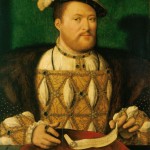 On this day in history, 11th February 1531, Convocation granted Henry VIII the title of “singular protector, supreme lord, and even, so far as the law of Christ allows, supreme head of the English church and clergy”, and it was George Boleyn, Lord Rochford and brother of Anne Boleyn, who played a prominent role in persuading Convocation of the scriptural case for the King’s supremacy.
On this day in history, 11th February 1531, Convocation granted Henry VIII the title of “singular protector, supreme lord, and even, so far as the law of Christ allows, supreme head of the English church and clergy”, and it was George Boleyn, Lord Rochford and brother of Anne Boleyn, who played a prominent role in persuading Convocation of the scriptural case for the King’s supremacy.